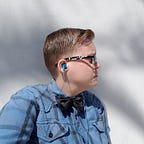The Plastic Straw Dilemma is not what it seems
Alright folks, this is open for the public. Strap in, put on your thinking caps, and open your ears. Er…eyes, in this case.
STRAWS ARE RUINING THE WORLD! MUST! GET! RID! AHHHHHH!
Calm your jets spaceman, it’s not THAT big of a deal.
So, if you don’t know, I have VACTERL syndrome and used to be fed through a tube. Even now, sometimes I’m in severe pain and can barely sit up, in which in order to drink anything I would need a bendy straw.
And this straw thing has rioted up the disabled community for good reason. Once again, nobody is listening and thinks everyone is making excuses and for some reason thinks straws are the pediment of our environmental doom because…media.
However, most reusable straws don’t bend, which….is actually a crucial function for disabled folks who need one because of their posture, strength, or other bodily function.
Most reusable straws such as metal, bamboo, glass, silicone, acrylic, paper, etc. have allergy risk, difficult to clean, and can’t bend. Not to mention they cost way more than a plastic straw.
Now, that’s the main argument. But I actually want to take you further along this journey, to let you see this actually isn’t about environmentalism as much as it is a zero waste fad of distraction from the bigger problems.
For one, according to bloomberg.com, “Yet even if all those straws were suddenly washed into the sea, they’d account for about .03 percent of the 8 million metric tons of plastics estimated to enter the oceans in a given year.”
Banning straws won’t even make a DENT to our enviornment.
Even so, companies like Starbucks are not only selling reusable straws INDIVIDUALLY PACKAGED IN PLASTIC
their cups will also have a plastic “sippy cup” function, which is more plastic than a straw.
And yet they try to say they’re saving the environment. Riiiight.
But let me put it to you this way: Why are we so distressed about little straws, when everything we buy at the store is covered in plastic? Shampoo, dishwasher soap, most spices, any frozen product, sometimes even fresh produce, q-tips, toothpaste, toothbrush, toilet paper, paper towels, pill bottles, any first aid equipment (even if it’s in a cardboard box, you have to rip off plastic), trash bags, cleaning products
And the optional stuff like plastic water bottles, plates, utensils, dryer sheets, and plastic cups. Oh, and shipping material if you’re on amazon a lot.
These are all just household items. The fact is, even if everyone at home went “zero waste” it would only make a dent in the enviornment. Why?
Because we’re forgetting about the companies who use and benefit from this stuff. Plastic take away trays, utensils, plates, water bottles, condiment wrappers/bottles, throw away cups, like everything except technology in a company, is mostly one-use plastic products.
This includes schools, restaurants, offices, hospitals, and stores. And they all have to buy in bulk, which means more plastic overall. And I doubt they use reusable bags for their purchases.
This doesn’t even go into food waste or carbon footprint or any of that. I could make that part of the case, but this topic started on plastic straws and the uproar on plastic.
The point is, no, disabled people usually don’t have an aid unless they can’t even dress themselves or go to the bathroom by themselves. It’s hella expensive.
Yes, disabled people choked and died before straws.
Yes, really, other reusable straws can cause allergic reactions, injury to a sensitive mouth, and straight up non-functional because you can’t bend them.
If you really cared about plastic waste and sea turtles, you would be boycotting your grocery stores to get rid of plastic packaging, as well as talking to your boss, hospitals, and schools to encourage reusable items instead of one-use plastic.
Not yelling at disabled people because we need to make every 0.3% count on the enviornment.
